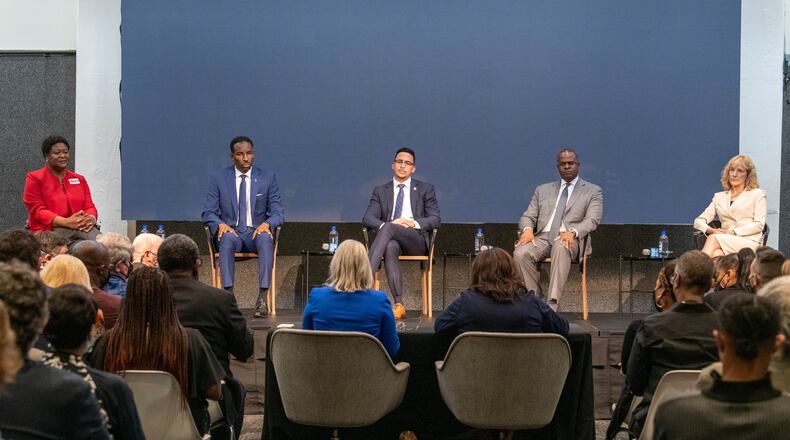For candidates vying to become the next mayor of Atlanta, one of the biggest and most contentious responsibilities they would inherit is overseeing Hartsfield-Jackson International, one of the world’s busiest airports.
Owned and operated by the City of Atlanta, Hartsfield-Jackson handles tens of millions of passengers a year even during the pandemic, meaning it has an impact on people far beyond the city’s boundaries.
The Atlanta mayor appoints the airport manager and can guide decisions on major projects and priorities to pursue.
The airport has also been the center of controversy for decades, under scrutiny for contract awards worth tens of millions of dollars, particularly during an ongoing federal investigation into corruption at Atlanta City Hall that started during former Mayor Kasim Reed’s administration.
While a longtime city and airport contractor was charged with bribery, money laundering, tax evasion and witness tampering, state legislators at the Gold Dome sought to take over the airport, saying there needed to be a state authority running it to keep operations at an arm’s length from politics.
Atlanta Mayor Keisha Lance Bottoms and members of Atlanta City Council fought hard to deflect the airport takeover attempts, and other political issues such as hate crimes legislation, budget issues, the pandemic and voting restrictions took priority at the Capitol over the last couple of years.
But the lingering specter of a takeover attempt means the relationship between the mayor of Atlanta and governor of Georgia — one that has frayed during the pandemic — could be a key factor in the future of Hartsfield-Jackson.
And who becomes mayor can play a crucial role on other difficult policy matters and challenges faced by the airport, including whether smaller businesses are prioritized for new concessions rather than larger more experienced operators and what the airport does to address environmental challenges.
The airport falls under regulatory oversight of the Federal Aviation Administration, and many of the most important safety decisions at airports are made by experienced aviation professionals. But on projects and strategies under the purview of the City of Atlanta’s Department of Aviation, mayors can set their own priorities.
Multiple candidates have had direct experience with oversight of the airport, including Atlanta City Council president Felicia Moore, who for years sat on the transportation committee that oversees the airport and served as its chair.
Reed, who is running to return to the office of mayor, oversaw the airport during his previous term from 2010 through 2017, and his administration was responsible for negotiating the 20-year lease renewal with Delta, the dominant carrier at Hartsfield-Jackson.
And candidate Andre Dickens is the current chair of the council’s transportation committee.
Airport contracting is handled by the city’s Department of Procurement. And with two airport contractors charged with bribery in the last couple of years, Moore said “ethics does matter.”
With the state takeover attempt, “The No. 1 issue was corruption. The citizens need to elect a leader that is not a part of that,” she said.
Reed said the Delta lease includes a clause that would make it difficult for the state to take over the airport because bond financing would be significantly more expensive.
Reed also said if he is elected again, he will launch a search for a new airport manager who would prioritize environmental efforts.
“I do want Atlanta to make a more aggressive statement around sustainability,” Reed said “As we look to cool the planet by 2 degrees and look to be more environmentally friendly, I’m going to be looking to find a leader at Hartsfield-Jackson that wants to use Hartsfield-Jackson as a proving ground.”
Current airport manager Balram Bheodari, who was named to the position earlier this year, said he is neutral on the mayoral race. He said the airport is preparing a transition document and is prepared to brief whoever becomes the next mayor on the airport’s organizational structure, finances and development plan.
The airport has run into struggles over the years in its environmental efforts, including solar projects and a planned composting and recycling facility called Green Acres that was not successfully completed during Reed’s term. The airport did add hundreds of electric vehicle parking spots with chargers while Reed was mayor.
“The good thing about having done this job in two terms before is you’re able to focus on some things that we did not get done,” Reed said.
Mayoral candidate Sharon Gay, a Dentons attorney and former deputy chief of staff and executive counsel to former Atlanta mayor Bill Campbell, was not available for comment on the airport.
Other candidates also said if elected mayor, they would pursue ways to make it easier for newer, smaller businesses to win airport contracts.
Moore said “our whole contracting system needs to be reviewed... I want to make sure that new people get a fair shake.”
Dickens said he wants to see more small concessions packages that companies can compete for, with lower financial pre-qualifications to bid. “I think these pre-quals are prohibitive of new entrants,” he said.
Another candidate, councilmember Antonio Brown, said there are “the same concessionaires at the airport that are winning year after year,” who also help fund Atlanta politicians’ campaigns.
“In addition to them monopolizing the opportunities at the airport, I believe that because of the political entrenchment at the airport, it never allows opportunities for residents of our city that have a successful small business that could come into the airport and do great things,” Brown said. He proposed a fund “to help small businesses to enter the airport, because this can be a very costly process.... Then I think you level the playing field.”
About the Author
The Latest
Featured


